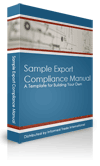Exporting Arms and other Defense Articles – an Introduction to ITAR Compliance
What are the basic rights and obligations of arms exporters under current federal law?
US-based arms exporters are legally entitled to sell, transfer, and export arms and other defense articles to foreign recipients – though these transfers may be subject to numerous regulatory controls.
Exportation of defense articles is seen as a crucial component in furthering various national security and diplomatic objectives. From a foreign policy perspective, the government authorizes exportation of defense articles as such exportation can help provide necessary equipment the defense of allied and friendly nations, deter military aggression, and promote geopolitical stability. To prevent unauthorized exportation and potentially indiscriminate arms transfers, however, the trade in arms and other defense articles has been strictly regulated.
As an arms exporter, you will have to meet the standards set by the International Traffic in Arms Regulations (ITAR), which implements the Arms Export Control Act (AECA) and is administered by the Directorate of Defense Trade Controls (DDTC) of the State Department.
If you are exporting arms and other defense articles that are absent from the United States Munitions List (USML), as set forth in ITAR section 121, then the regulations will not apply. If you are unsure whether your arms export is covered by the USML, then you may file a Commodity Jurisdiction request for an official determination.
Posted on August 1st, 2016 by admin
Filed under: ITAR

